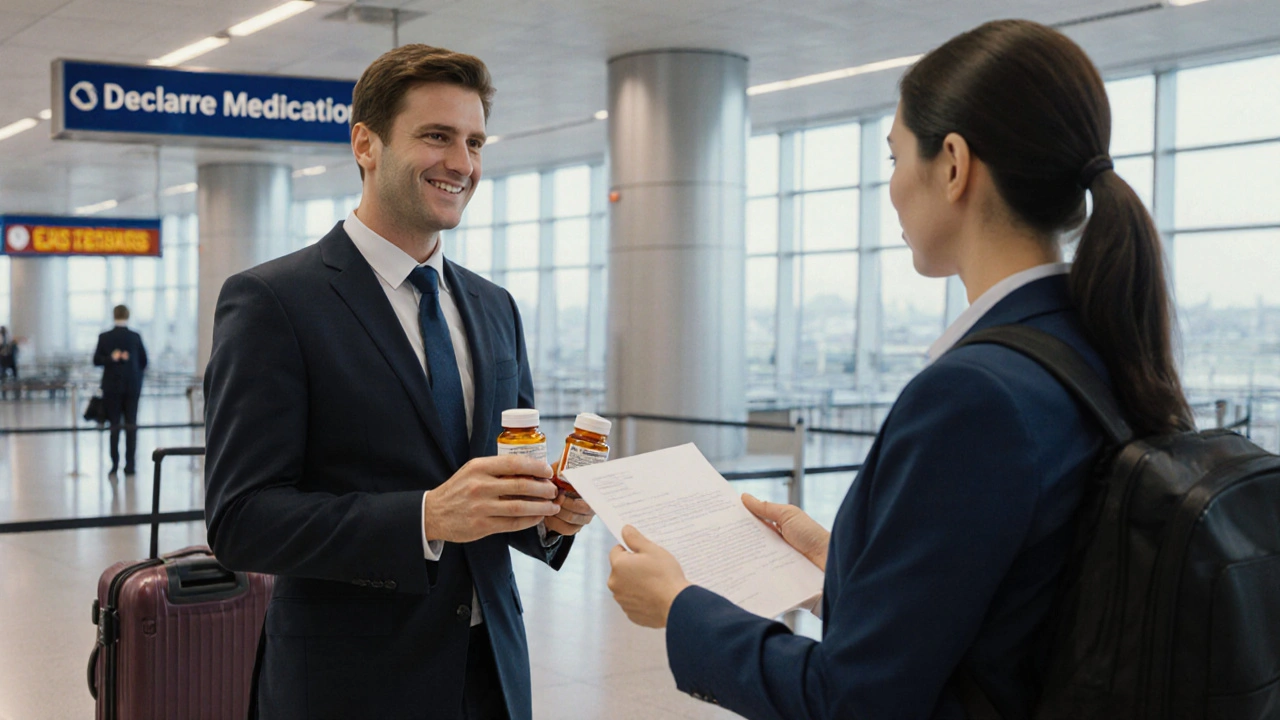Carry Prescription Drugs Abroad: What You Need to Know Before You Travel
When you carry prescription drugs abroad, the legal and practical rules for bringing medication across international borders. Also known as traveling with medication, it requires more than just tossing your pills into a suitcase. Every country has its own laws, and what’s legal in the U.S. might be banned, restricted, or require special paperwork overseas. You don’t need a lawyer to get through customs—but you do need to know what’s allowed, how to prove it’s yours, and what happens if you get caught without it.
Most countries allow you to bring a reasonable amount of prescription medication for personal use, but only if it’s in its original container with your name on the label. That means no pill organizers, no bulk bottles, and no unlabeled capsules. You’ll also need a copy of your prescription or a letter from your doctor explaining why you need it. Some countries, like Japan and the UAE, have strict lists of banned substances—even common OTC meds like pseudoephedrine or certain painkillers can trigger alarms. If you’re taking controlled substances like Adderall, Xanax, or opioids, you might need an international drug permit, a special authorization required by some countries to bring controlled medications into their borders. The U.S. State Department recommends checking the destination country’s embassy website before you go. And don’t assume your airline knows the rules—flight attendants aren’t customs officers.
At U.S. airports, the TSA medication rules, guidelines for carrying prescription drugs through U.S. airport security checkpoints. allow you to bring liquids over 3.4 oz if they’re medically necessary, but you must declare them. Keep your meds in your carry-on—never in checked luggage. Lost bags happen. If your meds are in a checked bag and it goes missing, you could be stranded without your treatment. Also, never mix different prescriptions in one bottle, even if they’re yours. Customs agents see that as potential drug trafficking. Bring enough for your entire trip plus a few extra days, just in case your flight gets delayed.
Some travelers think they can just hide their meds or lie about them. Don’t. Countries like Thailand, Singapore, and Saudi Arabia have harsh penalties for drug violations—even if you didn’t mean to break the law. A simple misunderstanding can lead to detention, fines, or worse. It’s not worth the risk. If you’re unsure, call the embassy of your destination country. They’ll tell you exactly what you need. And if you’re taking insulin, EpiPens, or other injectables, bring a doctor’s note and keep them cool with a small cooler or insulated pouch.
Below, you’ll find real travel stories, country-specific guides, and practical checklists that help you avoid the mistakes most people make when carry prescription drugs abroad. Whether you’re flying to Europe, Asia, or the Caribbean, these posts give you the exact steps to stay legal, safe, and prepared—no guesswork needed.
- September 20 2025
- 13 Comments
- Lucas Harrington
How to Travel Internationally with Prescription Medication
Traveling internationally with prescription medication requires planning. Know your meds' legal status, carry original packaging and a doctor’s letter, bring extra supply, and declare everything at customs to avoid fines or detention.
- Disney World Vacations (35)
- Kissimmee Florida (29)
- Florida travel (26)
- Crypto & Blockchain (10)
- Information & Privacy (5)
- Blockchain & Cryptocurrency (4)
- Disney Parks & Tips (3)
- Disney History (3)
- Travel (2)
- Travel Tips (2)
Categories
- January 2026 (6)
- December 2025 (29)
- November 2025 (41)
- October 2025 (16)
- September 2025 (6)
- August 2025 (3)
- July 2025 (3)
- June 2025 (2)
- May 2025 (2)
- April 2025 (1)
- March 2025 (6)
- February 2025 (11)
Archives
- Florida beaches
- Disney World
- Florida
- Florida travel
- Kissimmee demographics
- Kissimmee
- Kissimmee Florida
- Orlando tourism
- Disney park hours
- Disney World tips
- Disney vacations
- Disney 100
- theme park tips
- Disney celebration
- tourism
- Disney secrets
- Disney history
- travel
- Disney World crowd calendar
- Disney World cost

